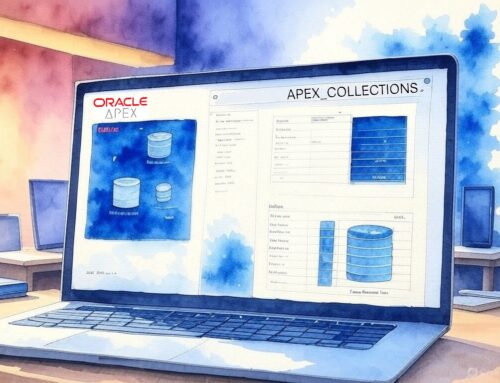Introduction
Oracle APEX Workflow was officially introduced in Oracle APEX 23.1 (released in May 2023) to enable developers to automate business processes efficiently. It allows information, tasks, and documents to move between users according to predefined rules, simplifying operations and improving productivity.
Some months later (October 2023) with APEX 23.2, Oracle introduced some improvements to workflow execution, making the processes more efficient and expanding integration capabilities (new process automation features and better integration with APEX components).
Recently (January 2025), the new version 24.2 of Oracle APEX was launched, and with it, new enhancements to the Workflows tool: (What’s New in Oracle APEX 24.2)
| Enhancement | Description |
|---|---|
| Workflows within Workflows | The new Invoke Workflow activity allows you to call one workflow from another, enabling reusability and simplifying complex processes. |
| Copy from other apps | Duplicate a Workflow definition across different applications, making it easier to develop and implement similar processes efficiently. |
| Resume Workflow at any activity | Workflow administrators can now efficiently manage unexpected situations or human errors by restarting a suspended Workflow from any point within the process. |
| Modernized Human Task and Workflow pages | The Create Page wizard now builds human task and workflow pages with a streamlined layout, utilizing Template Components, menus, and modal dialogs. This ensures a consistent look and feel while making customization and maintenance more intuitive. |
| Additional Improvements | Enhanced utilization reports allow you to track Workflow usage in Task Definitions, Email Templates, and REST Data Sources. Also, you can now pass CLOB values to Workflow variables and parameters for improved data handling. |
Why “Workflows” are important?
Oracle APEX Workflows revolutionize business process automation and optimization. They allow developers to model, execute, and monitor complex workflows without heavy coding, making applications more efficient, scalable, and user-friendly.
These are some key reasons:
👍 Automating business processes efficiently
Many organizations handle repetitive tasks manually, leading to errors and inefficiencies. Workflows automate these tasks, ensuring:
-
Faster execution of processes.
-
Reduced manual intervention, lowering errors.
-
Better compliance with business rules.
Example: An example is automating the approval process for purchase orders, where the system routes the request based on predefined rules.
👍Low-Code, Visual Workflow Design
Oracle APEX provides declarative workflow management, allowing users to define workflow logic without extensive coding.
Example: A manager can configure a multi-level approval process with simple drag-and-drop actions instead of writing complex PL/SQL procedures.

Diagram builder – Purchase approval process overview
👍 Task Management
APEX workflows include a task management system where each step in the process is tracked as a task. This provides visibility into which tasks are pending, in progress, or completed.
Features:
-
Declarative workflow builder.
-
Configurable decision-making rules.
-
Pre-built actions for standard operations like approvals, notifications, and reassignments.
👍 Role-Based Approvals
APEX workflows allow the definition of role-based access and approvals, ensuring that only authorized users can approve, modify, or reject workflow steps.
-
An Employee submits a request.
-
The Manager reviews and approves/rejects.
-
The Finance Department processes the payment.
Benefits:
-
Ensures accountability.
-
Prevents unauthorized changes.
-
Supports hierarchical approval structures.
👍 Notification Support
The Workflows in APEX include built-in notifications via email, SMS (when integrated), or in-app alerts to keep users updated on task progress.
-
A Supervisor receives an email notification when a task is assigned.
-
An Employee gets a reminder alert if a task is pending beyond the deadline.
Benefits:
-
Configurable email templates.
-
In-app notifications.
-
Escalation emails for overdue tasks.
👍 PL/SQL Customization
For advanced use cases, APEX workflows support custom PL/SQL logic to extend workflow functionalities beyond declarative options.
-
A complex expense approval workflow where the system checks the amount and dynamically assigns approvers based on predefined business rules.
Benefits:
-
Use PL/SQL to define conditional workflow paths.
-
Integrate workflows with external APIs or database procedures.
-
Implement custom validation rules before progressing to the next step.
Conclusion
Oracle APEX workflows, especially in version 24.2, enhance automation, improve task tracking, and integrate tightly with APEX applications using a low-code approach. These features help developers and business users build efficient, structured workflows without needing extensive programming.
If you or your organization need help designing, implementing, or optimizing workflows in Oracle APEX, we can help! Our expertise ensures that your business processes are simplified, automated, and fully integrated with your APEX applications.
Let us know how we can support your workflow automation needs!







Leave A Comment